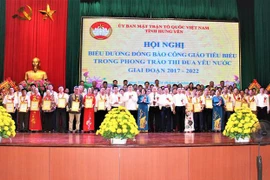 Hung Yen stabilises labour market to stimulate production recovery. - Illustrative image (Photo: VNA)
Hung Yen stabilises labour market to stimulate production recovery. - Illustrative image (Photo: VNA)The recruitment demand increased significantly since early 2022 as businesses resumed their operations. The demand for unskilled labourers rose by over 20%, while the demand of high-qualified and skilled employees also increased compared to 2021.
The provincial Department of Labour, Invalids and Social Affairs has directed its specialized units to survey the labour demand of enterprises, thus rolling out measures to stabilize the labour market and meet local businesses’ need of workers for production and business activities.
The provincial employment service centre has undertaken solutions to connect the labour supply - demand, promptly meeting enterprises’ labour recruitment demand as well as the need of employees to find jobs.
Since the beginning of the year, as many as 23 job fairs were organised by the centre, including eight online ones. The centre have posted recruitment information on its website, Fanpage, and Facebook, attracting nearly 260,000 visits.
It has provided job counseling for nearly 17,000 people and vocational training consultation for nearly 1,000 labourers; and introduced jobs to 4,500 people.
In the first six months of 2022, over 22,000 people in Hung Yen received vocational training, equivalent to 44% of the target set for the year, up 10% year-on-year. The rate of labourers having jobs after training reached over 92%.
The number of labourer getting jobs was 9,750 people in the period, including 560 sent to work abroad, equivalent to 39.8% of the plan in 2022, and 112% of the figure in the same period last year.
In the remaining months of this year, the recruitment demand of enterprises in Hung Yen is forecast to decrease compared to the first half because businesses are gradually stabilising their operation.
A number of garment enterprises have the need to recruit young employees to replace old-age workers who have quit their jobs, to ensure more efficient and stable production.
Meanwhile, the demand for high-quality labourers is predicted to increase.
The provincial Department of Labour, Invalids and Social Affairs will take measures to maintain the labour force, especially in industrial parks, to prevent disruption in the supply of labour for production and business.
In order to maintain a stable recovery pace of the labour market in the coming time, the province will also focus on improving business and investment environment, and accelerating economic development and recovery in the locality.
The employment service centre was directed to organise more job fairs to ensure the supply of labourers for businesses and introduce job opportunities for labourers.
The department is coordinating with sectors and localities to implement the policy of housing rent support under the Prime Minister's Decision No. 08/2022 /QD-TTg dated March 28, 2022. The provincial People’s Committee has required localities to speed up this scheme, towards swiftly supporting labourers who fell into difficulties due to impacts of the COVID-19 pandemic.
Attention will be paid to enhancing vocational training for labourers, thus opening opportunities for them to get stable jobs.
Vocational education institutions and businesses will strengthen coordination in the stages of enrollment, training and receiving labourers, and mobilising resources for vocational training activities.
Prime Minister Pham Minh Chinh recently chaired a nationwide teleconference linking all 63 cities and provinces on the development of labour market in a flexible, modern, sustainable and globally integrated manner.
After switching to the strategy of safely and flexibly adapting to and effectively controlling the COVID-19 pandemic, the domestic labour market has gradually recovered, making important contributions to socio-economic development.
The PM suggested building a modern and transparent labour market governance system, pooling resources to build multi-layered labour market forecast system at the provincial, regional and national level, diversifying credit sources to generate jobs in service of digital transformation, particularly for vulnerable persons in remote and mountainous areas.
It is a must to tackle difficulties in linking vocational training with enterprises, as well as offer incentives to workers for skill improvement, he said./.





























